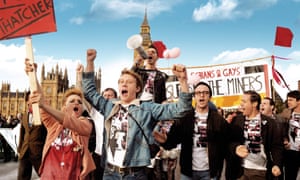
 Photo:theguardian.com
Photo:theguardian.com
“Traditions” is a word with rather conservative connotations, often used to justify injustices on the grounds that they have persisted for centuries. But Britain has other traditions that are often maligned or ignored: of rebelling against the status quo, rather than justifying it. Although many of our rulers would prefer us to believe otherwise, progress is not handed down as an act of munificence by the powerful, generously granting, say, women the vote or workers some basic rights. The mainstream view of history acknowledges the struggles against external threats, but our past is as much a story of Britons fighting Britons in a battle for rights at the expense of power.
Some of these traditions are captured by the powerful upcoming film Pride. It is about trade union struggles and LGBT politics, and yet looks set to be a resounding mainstream success rather than a niche arthouse classic. It focuses on the efforts of lesbian and gay campaigners to build solidarity for the miners’ strike of 1984-85. For gays and miners alike, this was a time of both suffering and struggle. The Aids crisis was building; more than half the population believed homosexuality was “always wrong”, peaking at 64% in 1987 when just 11% opted for “not wrong at all”; and later that decade the homophobic legislation, section 28, was introduced. Miners, on the other hand, were being battered by an authoritarian government that decreed them to be “the enemy within” and faced brutality on picket lines. Both were persecuted by the police, reviled by the tabloid media, and attacked by Margaret Thatcher’s administration.In the face of prejudice and suspicion, of course, making common cause was not easy
Mike Jackson – a co-founder of Lesbian and Gays Support the Miners, on which the film focuses – tells me that the episode “has been airbrushed out of history by omission and neglect”. It is a travesty, because this part of history reveals the true meaning of solidarity, encapsulated by the trade union slogan “an injury to one is an injury to all”. The basis of solidarity is this: you have common interests and a common enemy that eclipse your differences, and you strengthen your hand by uniting and using your collective strength. As Jackson puts it: “The one thing the ruling class don’t want is solidarity; they don’t want us to join the dots up.”
A cynical response would be to note that the miners were defeated, however much solidarity they may have attracted. The trade union movement was left demoralised; virtually all the pits closed, as miners’ leader Arthur Scargill had predicted; and many of the old mining communities never recovered and to this day lack secure work. But the miners, at times, came much closer to victory than is often thought. And as Pride so movingly demonstrates, the episode, though not sufficiently recognised at the time, ultimately proved to be a decisive step forward for gay and lesbian rights.
I am not embarrassed to admit that I wept at this beautiful film, but I only realised why afterwards. The film manages to convey what solidarity is to an audience who have been taught to abhor it. Thatcherism was always about breaking down common bonds in favour of selfishness; of reducing us to individuals; of believing that we improve our own lot solely through our own efforts rather than by linking together with others. That solidarity was not entirely expunged from the national psyche was despite Thatcherism’s best efforts. This weekend, hundreds began marching from Jarrow to London in support of our NHS. In 2012, British electricians staged strikes and occupations against an attempt by multinational Balfour Beatty to slash their terms and conditions – and they won. By occupying tax-dodging businesses, UKUncut forced a national debate about tax avoidance. Solidarity still lives and breathes.
“Real change always comes from the bottom up,” says Jackson. “Change has never come from the top down, it comes from ordinary people, not so-called politicians or leaders.” Amid the laughter and occasional sobs that will soon consume cinema audiences, I hope Pride reminds a new generation of that eternal truth. The powerful should fear it.”
This article was first published in the Guardian, Monday 18 August 2014
The British tradition that Thatcher could not destroy | Owen Jones | Comment is free | The Guardian
Pride- Official Launch Trailer
Pride - Official Launch Trailer (2014) Bill Nighy, Andrew Scott, Imelda Staunton [HD] - YouTube
Read more on the tragic consequences of Thatcherism:
Thatcherism- the poisonous ideology that became the global norm
